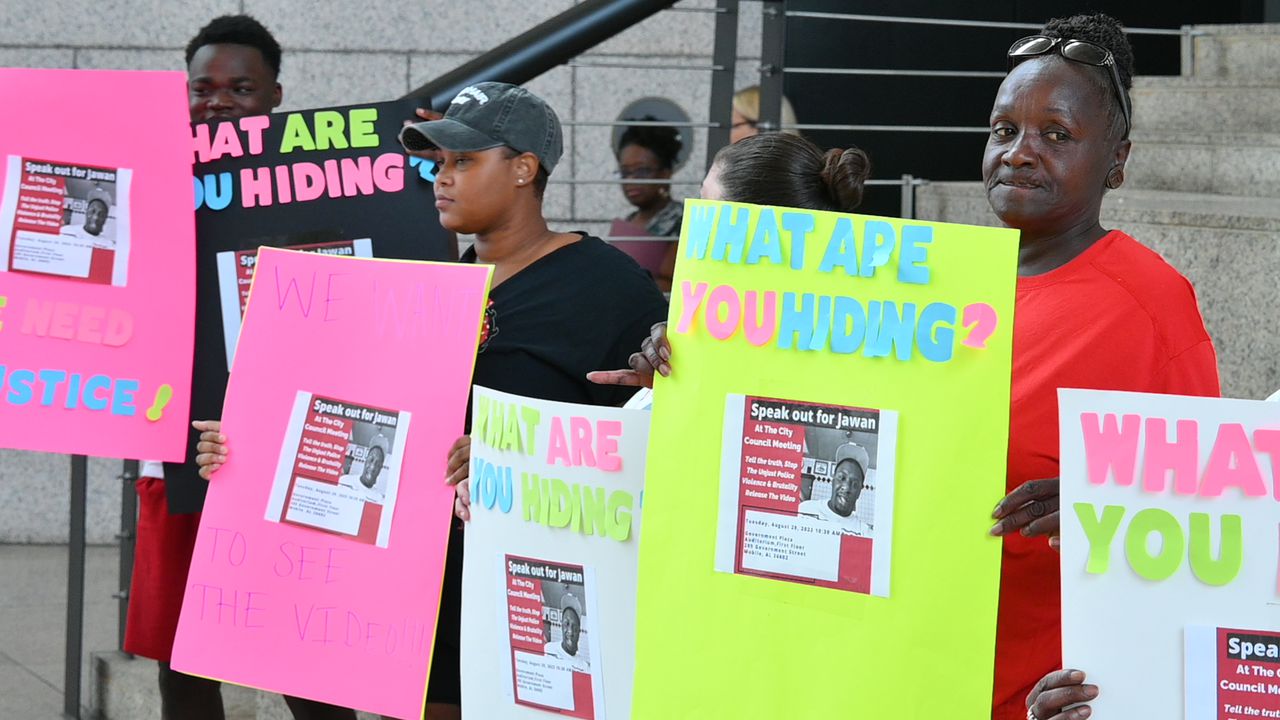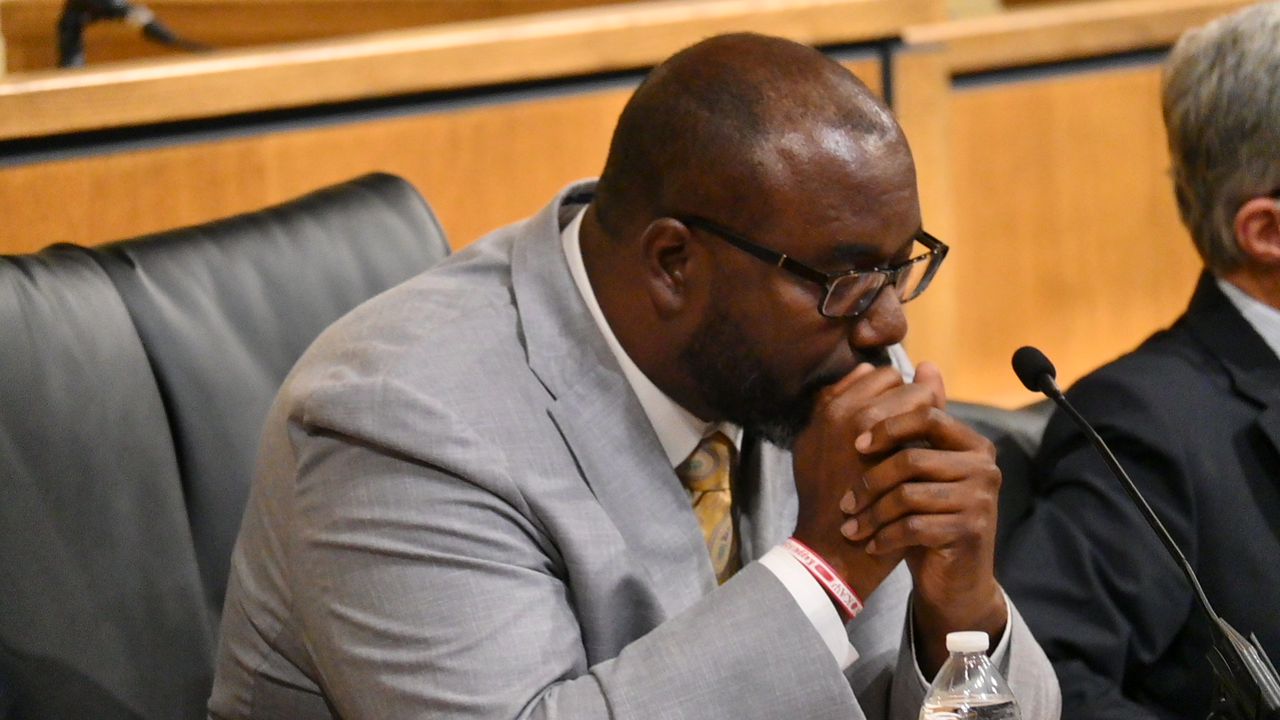Frustration surfaces over city handling of officers involved in Jawan Dallas death
Distrust and anger continued to be expressed before the Mobile City Council on Tuesday over the handling of an investigation into July 2 death of 36-year-old Jawan Dallas.
The latest questions revolved over why Mobile city officials announced last week that the unnamed officers involved in the fatal encounter with Dallas are not considered a “threat to the community,” were back on patrol, and may have not been responsible for his death.
Those pronouncements from Police Chief Paul Prine and Chief of Staff James Barber came amid ongoing public silence from authorities over the circumstances surrounding Dallas’s death.
Dallas was killed during a police encounter after he was reportedly struck by a Taser during a traffic stop while authorities were investigating a burglary in Theodore, but the particulars behind his death are unknown.
An autopsy has not been released. Authorities have repeatedly claimed that Alabama state law bars them from releasing any evidence because the investigation is going before a grand jury, and the process is meant to be secretive.
“The excuse we keep hearing is the grand jury needs to investigate the event,” said the Rev. Jim Flowers, pastor at All Saints Episcopal Church in Mobile. “But the chief of police has said publicly (the officers involved) present no danger to the public. Does that not prejudice a jury?”
City statements
Mobile City Councilman William Carroll at the Mobile City Council meeting on Tuesday, May 9, 2023, at Government Plaza in Mobile, Ala. (John Sharp/[email protected]).
Some council members expressed concerns over a city personnel decision that was made to put the police officers back on patrol while multiple investigations continue. They also remain frustrated that the Dallas family cannot view evidence in the case, despite repeated pleas to do so.
The entire City Council is calling on Mobile County District Attorney Keith Blackwood to expedite the release of evidence and to conclude the grand jury process “as quickly” as possible.
“If we have the information and we are able to make a public statement to put someone back to work, and we have evidence we use to give to the grand jury to make that clear, then why can we use it, but the family can’t,” Councilman William Carroll said. “It seems like a double standard there.”
Said Councilman Cory Penn, “My concern to this matter is that you have an investigation (ongoing) and those officers have returned to the job. What if the investigation shows they were wrong, and you have officers (patrolling) for a whole year dealing with the community, and now they are convicted?”
Carroll said the comments from Prine and Barber were broadcast by local TV media outlets, fueling what he said is a perception that the officers did nothing wrong despite the ongoing criminal probe.
He said their comments could be viewing as tainting a prospective grand jury. Blackwood, in his response to the City Council, said he wanted to ensure the grand jury process “remains in the hands of the citizens” and is not diminished by “social or outside pressures.”
Barber and Prine did not comment on the case during Tuesday’s meeting.
“Someone from the city made the statements that ran in the media,” Carroll said. “It ran for a couple of days. For the water being tainted, I think it’s already been done.”
Tara Zieman, a spokeswoman for Blackwood said it’s “impossible to know” whether any information released by the city can be considered a taint on a prospective jury pool.
Separate investigations
City Attorney Ricardo Woods said the decision to have the officers return to their patrols is separate from the two criminal investigations. Those probes are being handled by Blackwood’s office and U.S. Attorney for the Southern District of Alabama.
“We can’t make a determination of innocence or guilt,” Woods said. “We cannot make a determination of innocence or guilt no matter what people perceive. Keeping officers off the street presumes guilt.”
He added, “We made a collective decision to hand over (evidence) to the DA’s office for the grand jury proceedings. If there is wrongdoing, there is an outside process at the state level. Secondary to that, we made a collective decision to hand it over to the federal government so the FBI can come in and take a look at it. People were calling for independent investigations.”
Woods said that authorities cannot release evidence, adding that if city officials do not find wrongdoing, “we put them back to work.”
Carroll said his concern is with an appearance that the city is handling the investigation in a non-transparent way. He said there continues to be a growing concern in the community over the matter, and the latest perception is that the City of Mobile “cleared our guys.”
He said it’s concerning that the Dallas family is not able to receive the same information that is provided to Barber, a former police chief.
“I think if the city has information that clears these officers that is clearly available and we (based) our decisions on then we should be free enough to help the family with the same information,” Carroll said.
Woods said that the Dallas family has declined to sit down with Barber or other city officials to discuss some of the evidence in the case.
Seeking information

Friends and family members of the late Jawan Dallas gathered at Government Plaza on Tuesday, August 29, 2023, to rally in support of releasing body cam footage of his death by a Mobile police officer during an altercation on July 2, 2023. (John Sharp/[email protected]).
The Dallas family has demanded access to police-worn body camera footage from the encounter, which they have not been allowed to see. Woods and District Attorney Keith Blackwood have both said that the body cam footage cannot be released to the family because of Alabama state law prohibiting evidence released to the public during an investigation going before a grand jury.
“(Dallas’s) mother has a right to see the (body cam) video and a right to know how her son died,” said Betty Martin, a Mobile resident. “It’s been so long and she doesn’t know the cause of death for her son. It’s ridiculous. She should know all of that.”
Woods has warned council members that any violation of the state’s grand jury secrecy act is a felony punishable by up to three years in prison or a $5,000 fine.
Residents say they are concerned about how the case is being handled publicly at a time of greater national scrutiny over violent police encounters with Black men.
Mobile has had three fatal encounters involving police and Black men within the past year.
The District Attorney’s Office, last week, confirmed there will be no criminal prosecution of the police involved in the March 7 death of 25-year-old Kordell Jones during a raid of a Charles Street house. Jones was shot and killed by a Mobile police officer after he ran out of the house, naked and carrying an AR-style gun.
Police dismissed calls for releasing the body cam footage of that encounter, and then blamed Jones’s brother – Jason Jones of Mobile – for being involved in criminal activity that led to police to raid the home in the first place.
Christopher Jones, 24, was also shot and killed by a Mobile police officer during an October 2 incident on Glenwood Street. Police said they told Jones, who was on top of a roof, to come down and when he did, they said he pointed a shotgun at officers “in a manner to shoot.”
Jones was shot and killed, sparking concerns about de-escalation training within the Mobile Police Department.
Michelle Simons of Mobile said she was concerned over the lack of information and transparency that has come out from the investigations.
“I don’t think this administration and council are fully aware of the level of bad faith that is created by a lack of information follow-through,” she said.
